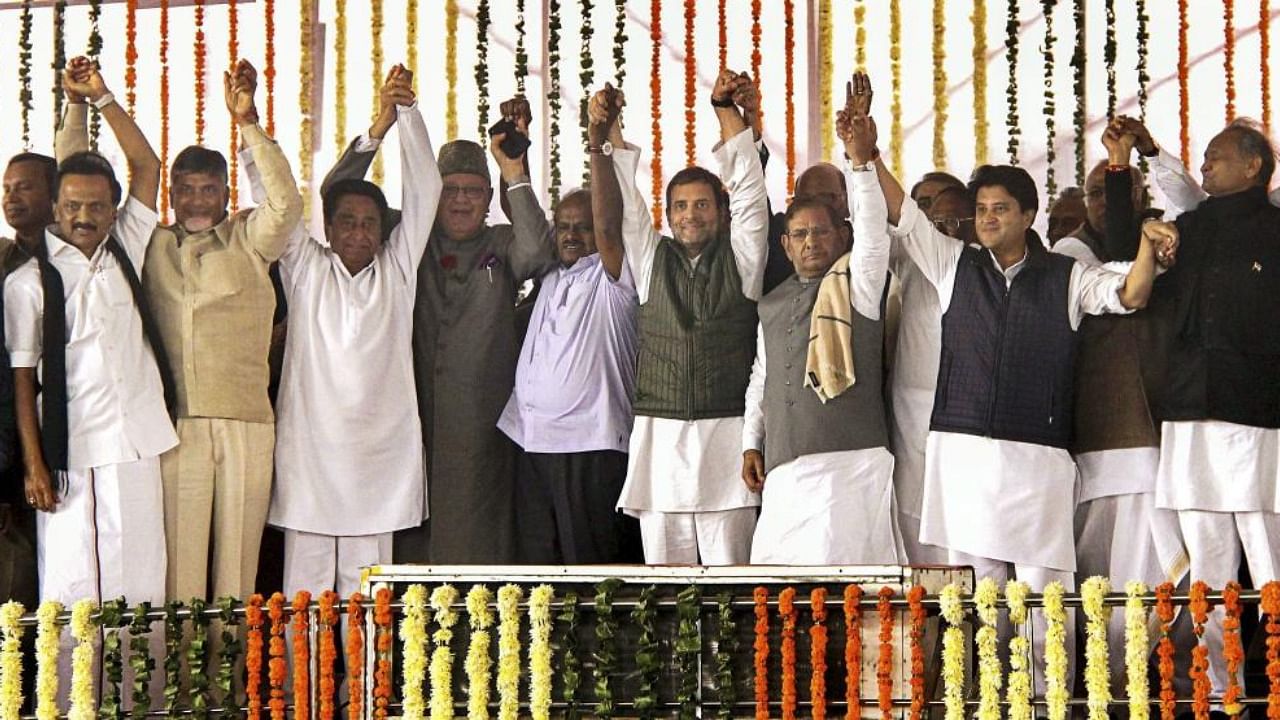
The ruling Bharatiya Janata Party (BJP)’s demand for an apology by Congress leader Rahul Gandhi in Parliament for his statements outside the country is uncalled for, and laced with a dangerous precedence. At another level, it reeks of a cunning political plot to pit Gandhi as a contender for the top job in 2024 and, at the same time, project him as unsuitable for it.
Gandhi’s remarks made while he was in the United Kingdom had little or nothing that he had not said during his successful Bharat Jodo Yatra, spread over 4,000 kilometres and 136 days. To some, the call for restoration of democracy, decline of institutions including the higher echelons of judiciary, etc. have sounded a bit jarring, and sweeping, and it was nothing more than a point of view.
BJP MP Nishikant Dubey's demand for Gandhi’s expulsion from the Lok Sabha and citing Subramaniam Swamy’s precedence is ironical. Swamy's expulsion had taken place when an internal Emergency, imposed by then Prime Minister Indira Gandhi, was on. Does the BJP view such autocratic actions of the past worth emulating? It may not be out of place to mention that the era between 1975 and 1977 had many such as Dev Kant Barooah, Jagjivan Ram, AR Antulay, and Siddharatha Shankar Ray trying to blur the distinction between India and Indira (Gandhi). In 2023, we need to far more cautious and prudent in equating the two.
It is not that Rahul Gandhi should not be criticised for his political statements made at Cambridge University or elsewhere in London. The BJP and other political opponents are free to attack, mock, dissect, etc; but the bogey of criticising the government on foreign soil goes much beyond Prime Minister Narendra Modi's own pronouncements against the previous regimes in China, Denmark, Canada, etc.
Isn’t it a fact that George Fernandes and others mobilised support of the Socialist International, France, and others against Indira Gandhi? Was the Bharatiya Jana Sangh, the BJP's earlier avatar, wrong in siding with Fernandes against Indira Gandhi? Anyone familiar with the era would narrate several embarrassing, yet hilarious, encounters when supporters and opponents of Indira Gandhi would end up staying in the same hotel or meeting same set of dignitaries in London and other European capitals.
India has a rich (and acrimonious) history of political differences. When Congress leader Sanjay Gandhi was killed in an air crash in 1980, leaders in the Opposition, such as Atal Bihari Vajpayee, Chandrashekhar, and several others who were jailed during the Emergency, called on a grieving Indira Gandhi. Eyewitness’ account had it that Vajpayee and Chandrashekhar wept rather uncontrollably, unable to offer any words of solace to a grieving mother.
When the Opposition put pressure on the BJP-led National Democratic Alliance (NDA) government after the 26/11 attack, Congress leader Sonia Gandhi was first to call up Prime Minister A B Vajpayee inquiring about his well-being. Decades earlier, Congress leader Feroze Gandhi had lost his way in some villages near Allahabad while campaigning for the 1957 elections. He ended up spending the night at his political opponent's house, who graciously offered him a hearty breakfast before parting ways.
The current logjam in Parliament must end as both sides need to debate on matters of national importance. Rahul Gandhi must be given a chance to clarify his stand. If he has crossed any Laxman Rekha, it should be left to him to make amends. Similarly, the Union government should allow a discussion on the economic situation relating to the Adani Group, and spell out steps it has taken including probes at multiple levels.
The 2024 Lok Sabha polls are barely 14 months away. The BJP-NDA combine has an interest in pitting the 18th Lok Sabha polls as a Narendra Modi versus Rahul Gandhi contest. The Congress appears far less prepared for such a direct contest. More importantly, most regional parties, from the Trinamool Congress to Aam Aadmi Party to Bharat Rashtra Samithi to Samajwadi Party, etc, are unwilling to play a second fiddle to the Congress. The BJP managers and strategist are aware of these fault lines, and the continuous spotlight on Rahul Gandhi is strategic to prevent emergence of any credible or acceptable political formulation.
(Rasheed Kidwai is a political commentator, author, and visiting Fellow at Observer Research Foundation. Twitter: @rasheedkidwai)
Disclaimer: The views expressed above are the author's own. They do not necessarily reflect the views of DH.